Does your website fall from the top places of SERPs? Is the Organic Traffic Drop affecting your business? Well then, ask yourself those questions below to fix it, shall we?
Seeing your site drop organic traffic is very frustrating, and being unable to fix it will surely make your heart skip a beat. However, the tracking problems process is outrageous since the factors contributing to your site’s SEO performance are various and complicated. Therefore, we would love to share the list of 10+ questions that will help you narrow the range of the problems.
Ever Considering “Why Did My Organic Traffic Drop”?
When maintaining a website, perfecting the design layout is important but you should care more about the traffic to your site, too. A nice website with low or zero traffic can’t be compared to a normally designed site with a high traffic and conversion rate.
Organic Traffic Drop: How to Measure Organic Traffic
Measuring organic traffic isn’t complex since all Google metrics will show you the data in numbers.
You can evaluate and analyze the effectiveness of your blog content, social media content, and keyword research by looking at the audience insight section of your GSC (Google Search Console), which will display how highly ranked your organic search results and organic traffic are.
Let’s have a look at our main parts – questions for yourselves to investigate and fix the organic traffic drop.
Is There A Problem Related to The Brand Image?
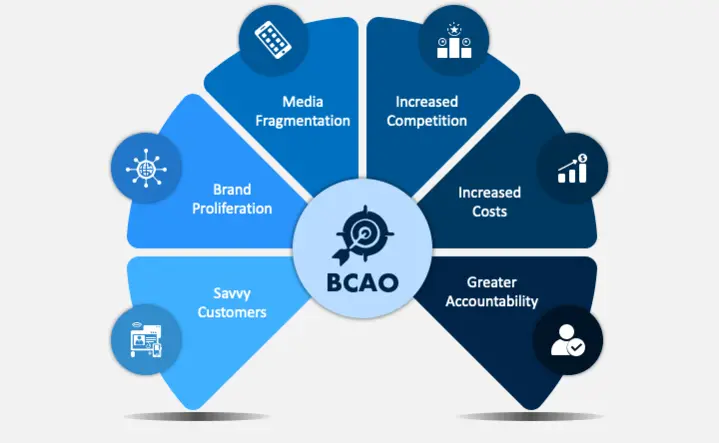
The more attention and awareness your brand can influence the audience, the more organic traffic is gathered as branding-search clicks. If the organic traffic drop happens by searching for your brand name, it’s not an SEO-related problem.

GSC can show the result quite quickly by filtering down to the keywords (with your brand name in the string) and comparing performances before and after the search.
What If A Tracking Problem Happens?
When asking this question, you will make sure that it is a tracking issue or not. Some popular signs are:
- GSC’s report is reporting very different metrics than your site’s analytics tools. Please remember that small differences are normal since they use different tools and metric systems.
- There is a chance that your Analytics tracking code is messed up. So is the Tag Manager application.
What About URLs & Keywords Diving?
In case your URL & keywords are nosediving, you can filter your GSC to find the traffic patterns. Therefore, you can point out the right issues without much time and effort.
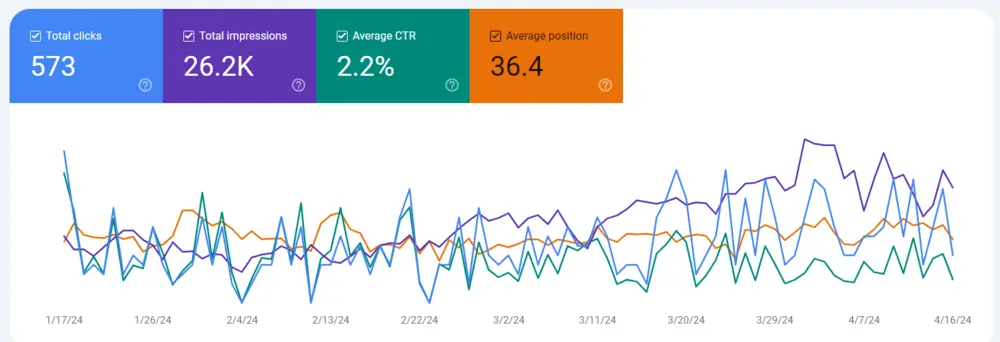
To detect organic traffic drop, you will focus on 4 primary metrics:
- Total clicks
- Total impressions
- Average CTR
- Average position
And those credentials below:
- URL: Which page’s traffic is dropping? Do they have a connection such as JS template or URL directory?
- Query: Which search terms are showing the nosedive?
- Seasonality: Can you check if the seasonal data displays the same rate of downtrend at the same time annually?
- SERP feature: Does the appearance downtrend drag down your organic results and clicks?
- Geography: Do SERPs feature your site locally or are there any regional changes from Google?
- Platform: Which platform do you lose visibility on, desktops/smartphones/tablets?
Is Traffic Your Priority?
Sometimes, you should ignore traffic to push up the conversion rate. You may focus too much on gaining organic traffic but forget that conversion rate will decide if your business is making much money or not.
Usually, you will recognize the conversion rate drop before the organic traffic drop. If the URLs or keywords contributing nothing to the conversion rate decrease organic clicks, you might not need to touch them.
What Does Your Trend Line Tell You?
In case you have reached this part, your site definitely has at least 1 SEO problem that makes your traffic and rates fall. The first one you will check is the site’s trendline.
You will read the trendline from left to right. If it displays a big drop in a short period, something bad is happening. This will happen after an update of the Google algorithm or your site’s development work such as a site migration.
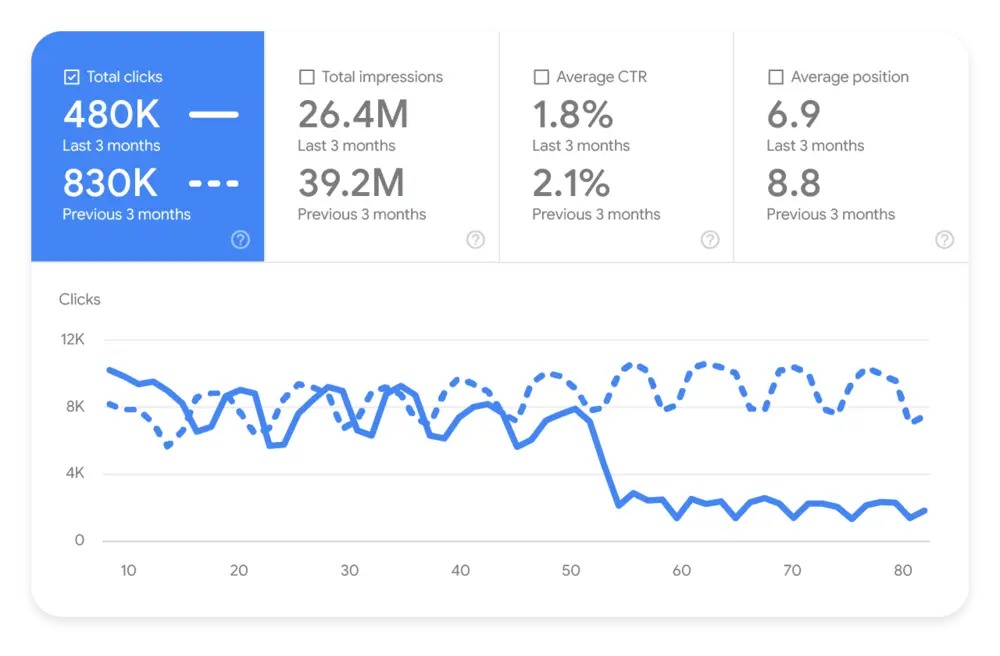
If your site is going downhill gradually like in the image above, you should check your site quality, domain authority (DA), and search landscape impact.
Do You Accidentally Change Your Site Content?
Changing content also contributes to the trendline, but updating for useful content is an exception. Content problems are practically given at some point unless you’re continuously editing, updating, and changing content for a few reasons:
- Search engines develop new content measurements to serve users more useful content.
- New content is made with new standards so the old content that doesn’t meet those criteria will nosedive.
May Some On-Site Technical Problems Happen?
If your site’s traffic looks like taking a long dive into Mariana Bay, you better check all possible technical problems.
A gradual trendline is mainly the result of overstacking small technical problems while a massive issue will cause your site’s organic traffic to run an Olympic-level dive. Therefore, a technical audit will come in handy. In this organic traffic drop case, you should focus on indexing/crawling status, meta robots, robots.txt, and canonicalization.
Are Your Referrers & Backlinks Gone?
2 things that can affect your SEO performance are internal and external stuff. While you can control internal factors, then what takes place outside of your site may cause the organic traffic drop.
First, you should check your site’s backlinks since they help Google identify your domain authority. There are many SEO tools to help you identify your DA and backlink such as Ahrefs or SEMRush. If you lose the backlinks or referrals from high DA sites, that will explain the situation, especially if your site is young and has a lower DA. 1 lost backlink doesn’t affect much, but how about a bunch of them?
Any Google Core Updates Recently?
If you never experienced your site being hit hard by a Google algorithm update, you might just be a newbie. The organic traffic drop caused by an algorithm update is very common, especially when Google just doesn’t announce all of the algorithm updates. Who knows when Google decides to update it in the shadow?
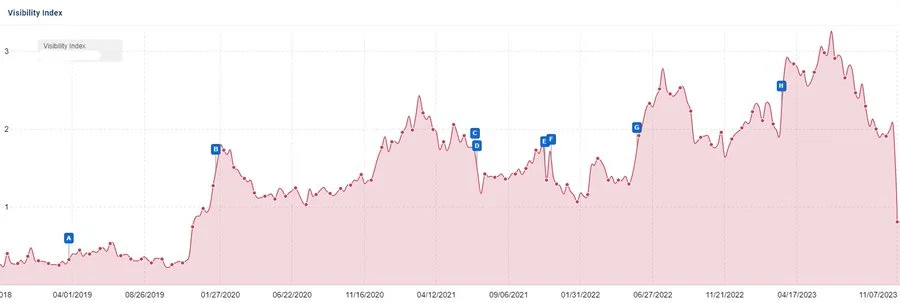
Does Your Domain Name Get Penalized?
An algorithm update applies to many websites, not just yours, and aims to improve search results. It might look like your site is being penalized, but it’s not personal. On the other hand, a domain penalty is specifically tagged to your site because Google decided it’s low quality or harmful. You can check for penalties in your Google Search Console account: Security -> Manual actions.
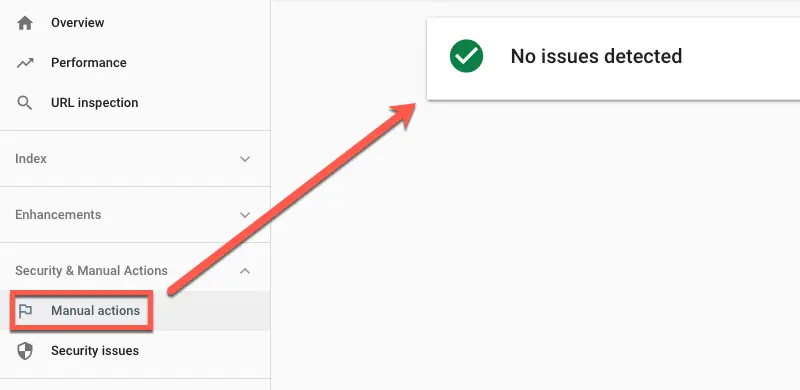
If it shows “No issues detected”, then congratulations!
Endnote For Organic Traffic Drop

Experiencing a small drop in organic traffic won’t hurt you but a massive and sudden drop will surely make you frustrated but you must go on and fix it.
After following the above question list, dig in and start your fixing process. Then, the sweet result is yours!
